Pressure Washing Lansdowne
Find top Commercial Pressure Washing in Lansdowne
Get up to 3 Commercial Pressure Washing quotes for your project today! Compare profiles, reviews, accreditations, portfolio, etc... and choose the best service.
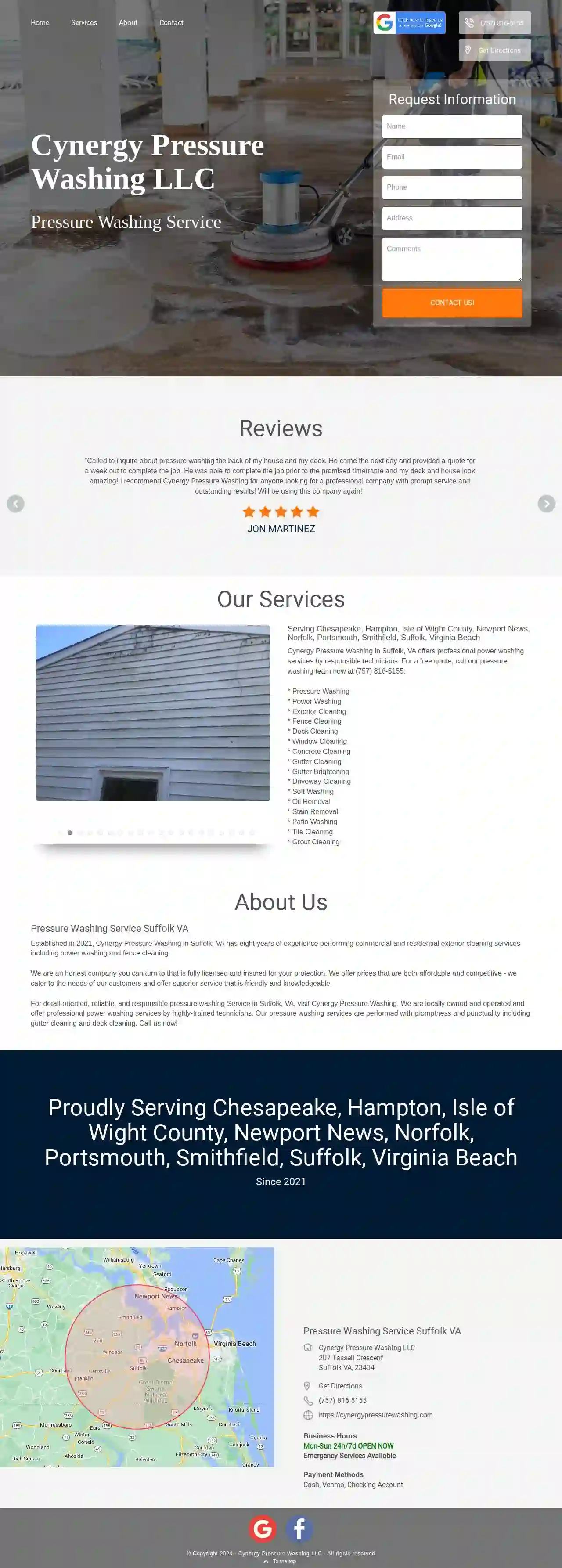
Cynergy Pressure Washing, LLC
4.610 reviews207 Tassell Crescent, Suffolk, 23434, USEstablished in 2021, Cynergy Pressure Washing in Suffolk, VA has eight years of experience performing commercial and residential exterior cleaning services including power washing and fence cleaning. We are an honest company you can turn to that is fully licensed and insured for your protection. We offer prices that are both affordable and competitive - we cater to the needs of our customers and offer superior service that is friendly and knowledgeable. For detail-oriented, reliable, and responsible pressure washing Service in Suffolk, VA, visit Cynergy Pressure Washing. We are locally owned and operated and offer professional power washing services by highly-trained technicians. Our pressure washing services are performed with promptness and punctuality including gutter cleaning and deck cleaning. Call us now!
- Services
- Why Us?
- Our Team
- Testimonials
- Gallery
Get Quote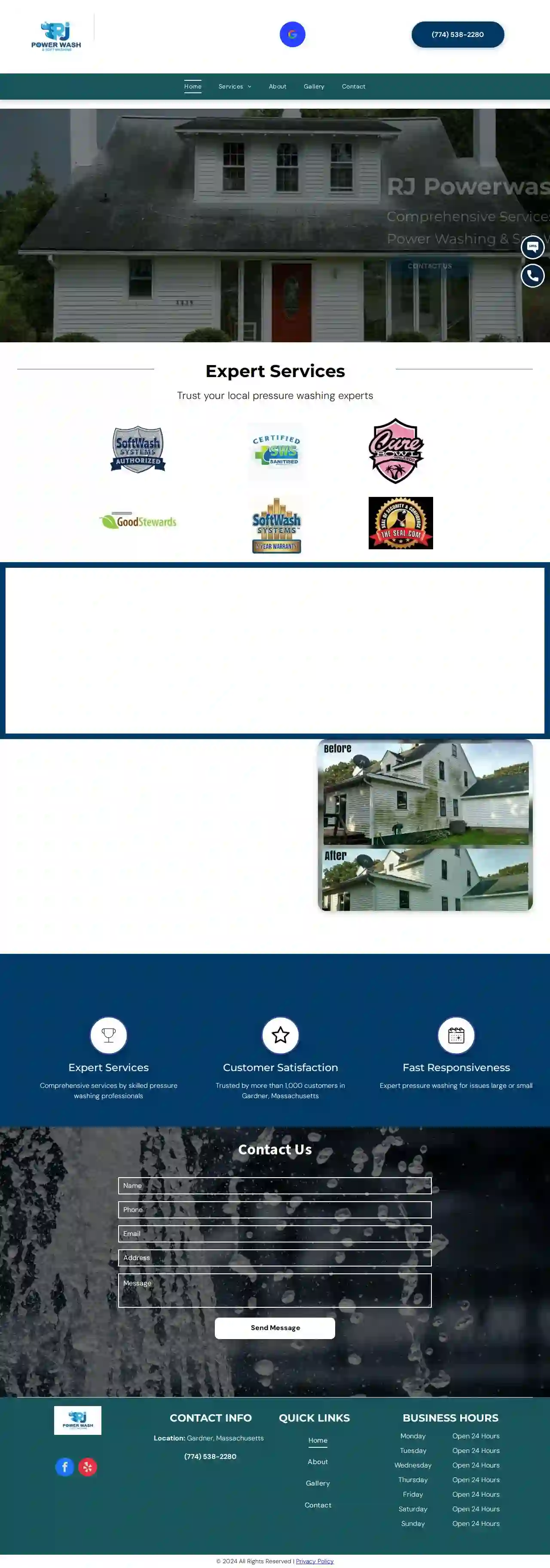
RJ Powerwash, LLC
596 reviewsHampton, USIntroducing RJ Powerwash LLC If you want your home to look its best, consider professional power washing & Softwashing services with RJ Powerwash, LLC in Worcester County, MA. We will quickly and effectively handle your exterior home cleaning service by completely removing dirt, sediments and other grime. Our team has years of experience as a licensed and insured power washing company. Build-up over time can cause damage to your home. Explore the benefits of our power washing & Softwashing services. We'll thoroughly clean and brighten your fences, floors, walls, roof and bricks. We specialize in roof cleaning, downspouts cleaning, your siding and windows. We know not everyone has the equipment and experience in concrete cleaning, fence cleaning, stucco cleaning and stone cleaning services. However, with us, you can relax and trust our seasoned experts to take the lead on your pressure washing. We power wash & soft wash exterior surface like a pro. Get in touch with our specialist concerning our driveway cleaning services and window cleaning services. At RJ Powerwash, LLC in Worcester County, MA, we put our best foot forward with each job. Restore the luster and brand-new look of your driveway, siding and windows. Our Services Power Washing Services Soft Washing Services House Washing Services Gutter Cleaning Services Exterior Surface Services Roof Cleaning Services Downspouts Cleaning Services Siding Services Fence Cleaning Services Stucco Cleaning Services Concrete Cleaning Services Brick Cleaning Services Stone Cleaning Services Window Cleaning Services Driveway Cleaning Services Solar Power Cleaning Services Patio & Deck Cleaning Services At RJ Powerwash, LLC, Our Mission Is To Provide The Best Quality Work And Customer Satisfaction
- Services
- Why Us?
- Accreditations
- Gallery
Get Quote
Williams Pressure Washing
5236 reviewsVirginia Beach, Virginia Beach, VA, USWilliams Pressure Washing Virginia Beach, VA ✆ 757-818-5086 Home About Us Services Pressure Washing Soft Washing Roof Cleaning Gutter Cleaning Concrete Cleaning Deck & Fence Cleaning Commercial Pressure Washing Services Gallery Reviews Contact Us Menu Home About Us Services Pressure Washing Soft Washing Roof Cleaning Gutter Cleaning Concrete Cleaning Deck & Fence Cleaning Commercial Pressure Washing Services Gallery Reviews Contact Us Home Pressure Washing Experts in Virginia Beach, Virginia Williams Pressure Washing was established in 2017, providing professional and reliable pressure washing and gutter cleaning to Virginia Beach, VA and South Hampton Roads residents. We offer many services including Safe Roof Cleaning, Low Pressure House Washing, Driveway Cleaning, and Gutter Cleaning. Give us a call today for a free quote! Call Now For Free Estimate Get A Free Estimate Now Williams Pressure Washing High Quality Pressure Washing Services The exterior of your home or business is what makes the first impression and adds to or detracts from your curb appeal. If you want your home or business to look its best, you should consider hiring our professional pressure washing team. Here at Williams Pressure Washing, we offer commercial and residential power washing solutions in Virginia Beach, Chesapeake, and South Hampton Roads area. We can professionally clean your building’s exterior, sidewalk, fences, driveway, floors and walls. We are fully licensed and insured, meaning you’ll have a total peace of mind while working with us. Even in the rare event that something goes wrong, you are fully covered. We pride ourselves in providing quality work and exceptional customer services. We always make sure every job, big or small, is completed with 100% customer satisfaction. We believe in prompt, accurate service and hold our crew to the highest expectations. Call Now For Free Estimate
- Services
- Why Us?
- Our Team
- Testimonials
- Gallery
Get Quote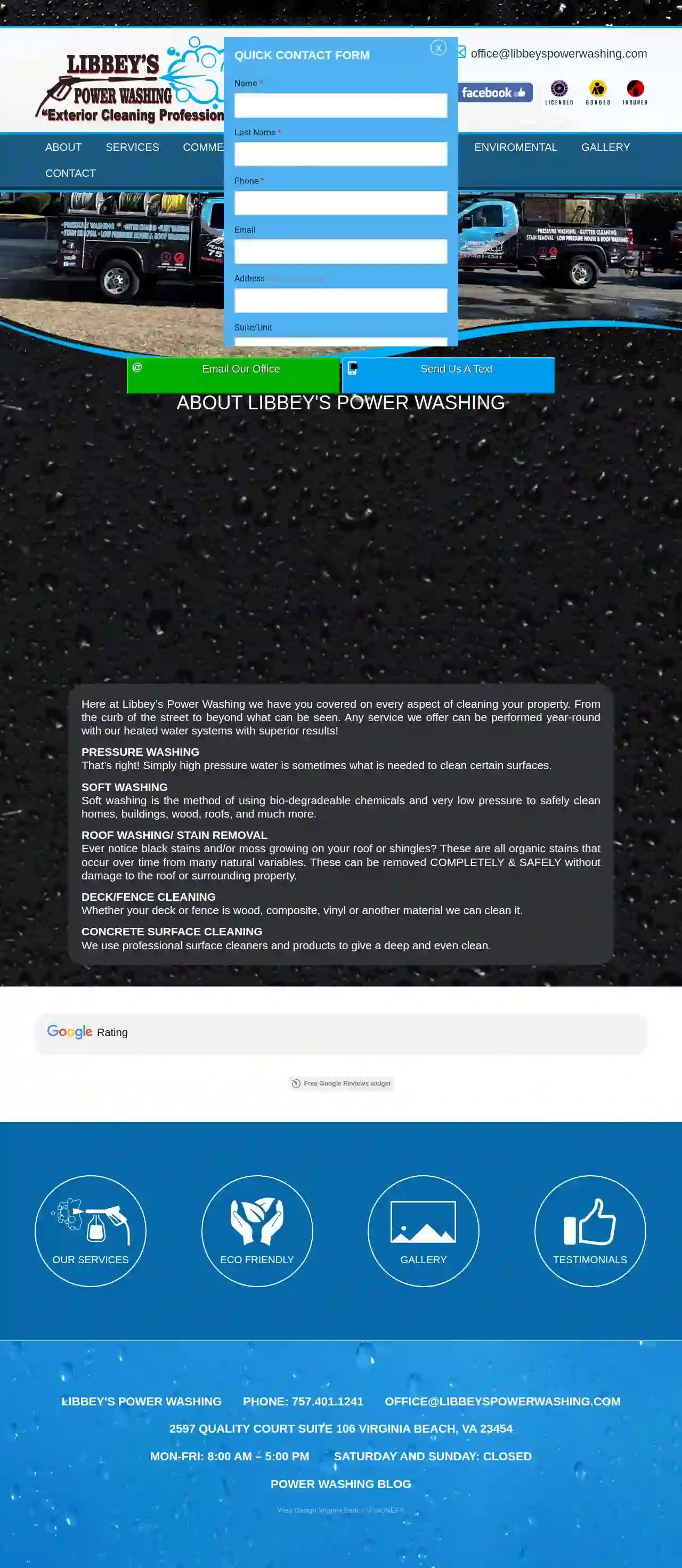
Libbey’s Power Washing
5404 reviews2597 quality court suite 106, Virginia Beach, 23454, USHere at Libbey’s Power Washing we have you covered on every aspect of cleaning your property. From the curb of the street to beyond what can be seen. Any service we offer can be performed year-round with our heated water systems with superior results!
- Services
- Why Us?
- Gallery
Get Quote
Everclean Pressure Washing
526 reviewsJacksonville Beach, USEverclean Pressure Washing is a professional and experienced pressure washing company that takes great pride in providing high-quality cleaning services to our clients. We understand that each job is unique and requires a proper technique to achieve the best results. With our expertise, we know how to properly assess each job and determine the most effective way to clean the area without causing any damage. Whether it's a residential or commercial property, we know how to get the job done right. With our attention to detail and commitment to customer satisfaction, Everclean Pressure Washing is the go-to choice for anyone in need of professional pressure washing services.
- Services
- Why Us?
- Our Team
- Testimonials
- Gallery
Get Quote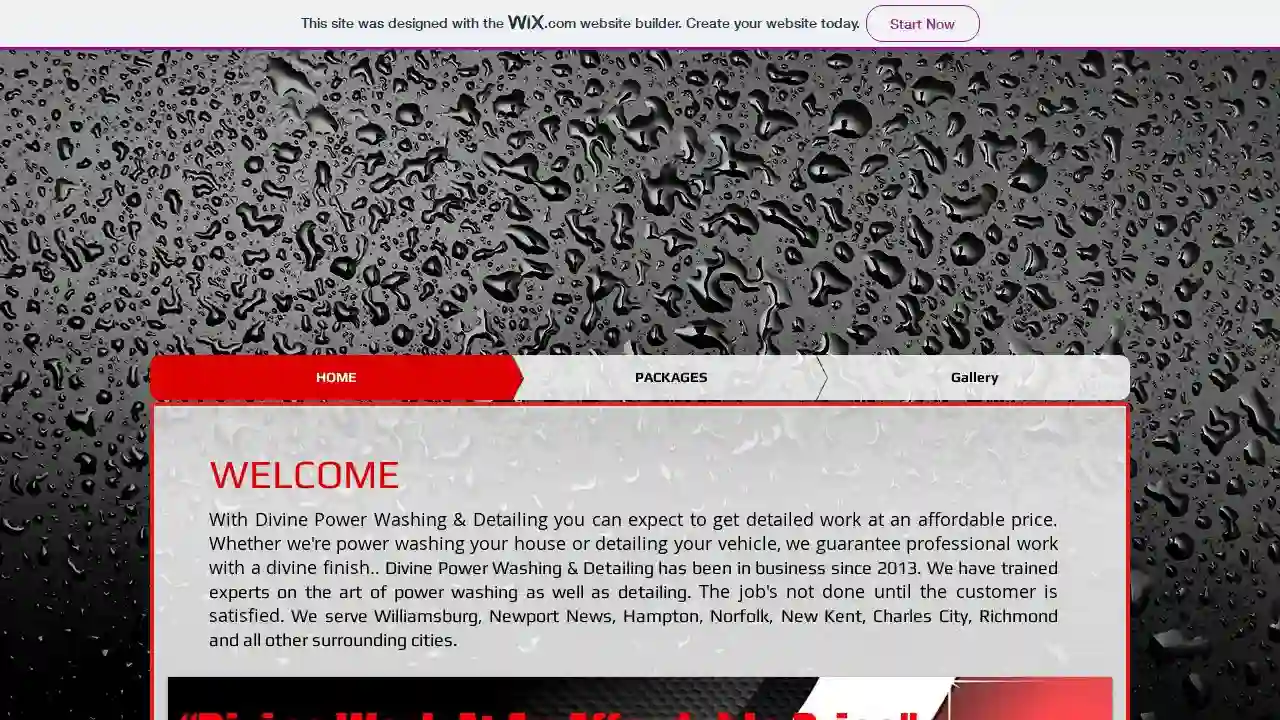
Divine Power Washing Plus LLC
4.58 reviews123 Main St, Suite 100, San Antonio, 78212, USDivine P&W Detailing is a premier mobile detailing service serving the greater San Antonio area. We are dedicated to providing high-quality, professional detailing services that exceed your expectations. Our team of experienced detailers uses only the finest products and techniques to ensure your vehicle looks its best. Whether you need a basic wash and wax or a full interior and exterior detail, we have the expertise to meet your needs. We are committed to providing exceptional customer service and ensuring your complete satisfaction. At Divine P&W Detailing, we understand that your vehicle is a valuable asset. That's why we take pride in providing meticulous attention to detail and delivering outstanding results. We offer a wide range of detailing services to meet your specific requirements, including: Exterior Detailing Interior Detailing Paint Correction Ceramic Coating Headlight Restoration And More! Contact us today to schedule your appointment and experience the Divine P&W Detailing difference.
- Services
- Why Us?
- Our Team
- Testimonials
Get Quote
ViewCrew Window Washing
5585 reviews86728, USWelcome to ViewCrew Window Washing At ViewCrew Window Services, LLC, we offer professional-grade pressure washing and window cleaning services to a wide range of residential and commercial clients throughout Massachusetts, from North Andover to Walpole, from Essex County to Plymouth County, we have you covered. If you are looking for trustworthy window cleaners and power washers, you’ve come to the right place! We are the NUMBER ONE rated local window washing and power washing company in the area with 590+ FIVE-STAR Google Reviews! We invite you to read our reviews and request a FREE quote. There’s a reason we have such good reviews, we don’t leave until you are satisfied with the work! We Bring The View That’s Right For You!
- Services
- Why Us?
- Gallery
Get Quote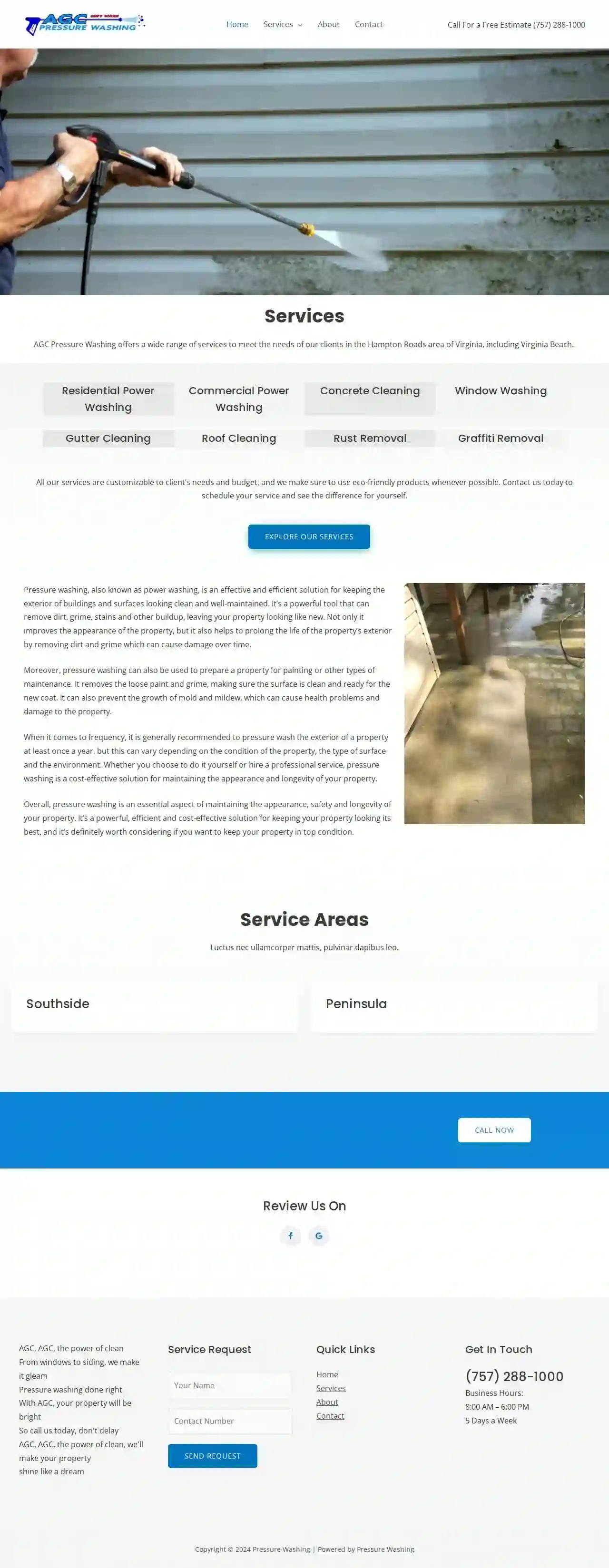
AGC Pressure Washing
Virginia Beach, USAGC Pressure Washing is a locally owned and operated business serving the Hampton Roads area of Virginia, including Virginia Beach. We offer a wide range of pressure washing services to meet the needs of both residential and commercial clients. Our team of experienced professionals is dedicated to providing high-quality service and exceeding customer expectations. We use eco-friendly products whenever possible and customize our services to fit each client's budget and needs. Whether you need your home or business exterior cleaned, we can help. Contact us today for a free estimate and see the difference AGC Pressure Washing can make!
- Services
- Why Us?
- Gallery
Get Quote
Fleet Clean of Roanoke
Roanoke, USFleet Clean is a premier provider of on-site mobile truck washing services, offering unparalleled convenience and quality to fleet owners nationwide. With a commitment to excellence, Fleet Clean sets the industry standard for efficient and sustainable vehicle cleaning solutions. Our approach to mobile truck washing programs provides customized services tailored to each client's unique needs. With meticulous attention to detail and a dedication to customer satisfaction, Fleet Clean delivers exceptional results. As a national franchise mobile truck washing company, our mission is clear: to prioritize your needs, maintain the utmost structural integrity, and provide unparalleled quality and customer service. With confidence and dedication, we deliver excellence in mobile truck washing. Discover the difference with Fleet Clean today.
- Services
- Why Us?
- Gallery
Get Quote
Hygenios LLC
4.939 reviewsRoanoke, USHygenios LLC is a Veteran owned, Power washing company with 10+ years of experience. We will make your home shine like never before! We are dedicated to making sure all of your needs are met with the expertise of a power washer, we make sure that everything is well taken care of, and everything is above and beyond what you had expected. Customer Satisfaction Guaranteed. If the job is not to your standards we will come back to make sure you have exactly what you asked for to ensure we are giving you 100% customer satisfaction!
- Services
- Why Us?
- Our Team
- Gallery
Get Quote
Over 60,241+ Cleaning Businesses in our network
Our janitorial contractors operate in Lansdowne & surroundings!
CleaningMatch has curated and vetted Top Janitorial Companies near Lansdowne. Find a trustworthy pro today.
Frequently Asked Questions About Pressure Washing
- Using Excessive Pressure: High-pressure water spray can damage delicate surfaces like wood siding or painted surfaces.
- Using the Wrong Nozzle: Different nozzles produce different spray patterns and pressure levels. Using the wrong nozzle can cause streaks, uneven cleaning, or damage.
- Holding the Nozzle Too Close to the Surface: Holding the nozzle too close can etch or damage the surface. Maintain a safe distance as recommended by the pressure washer manufacturer.
- Skipping Pre-Treatment: For stubborn stains or mold growth, pre-treating the surface with a cleaning solution can enhance cleaning effectiveness.
- Not Protecting Plants and Landscaping: Pressure washing chemicals and debris can harm plants and landscaping. Cover or shield sensitive areas before pressure washing.
- Clear Obstructions: Remove any objects, furniture, or debris from the areas to be pressure washed.
- Close Windows and Doors: Securely close all windows and doors to prevent water or cleaning solutions from entering your home or building.
- Cover Delicate Surfaces: Protect delicate plants, landscaping, or electrical outlets with tarps, plastic sheeting, or painter's tape.
- Inform Your Neighbors: It's a courtesy to inform your neighbors about the scheduled pressure washing, especially if noise or overspray is a concern.
- Communicate Special Instructions: Inform the pressure washing company about any specific areas you want them to focus on or avoid.
- Electric Pressure Washers: Suitable for light-duty cleaning tasks like washing cars, patios, or fences. They are less powerful than gas pressure washers but are generally more affordable and easier to operate.
- Gas Pressure Washers: More powerful than electric pressure washers, making them suitable for heavier cleaning tasks like removing stubborn stains, cleaning driveways, or stripping paint.
- PSI and GPM: Consider the PSI (Pounds per Square Inch) and GPM (Gallons per Minute) ratings. Higher PSI and GPM indicate a more powerful pressure washer. For most home cleaning tasks, a pressure washer with a PSI of 2000-3000 and a GPM of 2-3 is sufficient.
- Pressure Washing: If your siding is in good condition but dirty or stained, pressure washing can effectively restore its appearance without the need for painting.
- Painting: If your siding is faded, chipped, peeling, or damaged, pressure washing alone may not be sufficient. Painting provides a fresh coat of protection and a new look.
- Pressure Washing Before Painting: Pressure washing is an essential step before painting, as it removes dirt, grime, and loose paint, creating a clean surface for the new paint to adhere to.
What are some common pressure washing mistakes to avoid?
If you're unsure about pressure washing techniques or the appropriate pressure levels for your surfaces, consult with a professional pressure washing company.
How do I prepare my property for pressure washing?
By taking these preparatory steps, you can ensure a safe and efficient pressure washing experience.
What type of pressure washer do I need for my home?
If you're unsure about the type of pressure washer best suited for your needs, consult with a pressure washing professional or a home improvement specialist.
Is it better to pressure wash or paint my house?
Assess the condition of your siding and your desired outcome to determine whether pressure washing, painting, or a combination of both is the best approach.
What are some common pressure washing mistakes to avoid?
- Using Excessive Pressure: High-pressure water spray can damage delicate surfaces like wood siding or painted surfaces.
- Using the Wrong Nozzle: Different nozzles produce different spray patterns and pressure levels. Using the wrong nozzle can cause streaks, uneven cleaning, or damage.
- Holding the Nozzle Too Close to the Surface: Holding the nozzle too close can etch or damage the surface. Maintain a safe distance as recommended by the pressure washer manufacturer.
- Skipping Pre-Treatment: For stubborn stains or mold growth, pre-treating the surface with a cleaning solution can enhance cleaning effectiveness.
- Not Protecting Plants and Landscaping: Pressure washing chemicals and debris can harm plants and landscaping. Cover or shield sensitive areas before pressure washing.
If you're unsure about pressure washing techniques or the appropriate pressure levels for your surfaces, consult with a professional pressure washing company.
How do I prepare my property for pressure washing?
- Clear Obstructions: Remove any objects, furniture, or debris from the areas to be pressure washed.
- Close Windows and Doors: Securely close all windows and doors to prevent water or cleaning solutions from entering your home or building.
- Cover Delicate Surfaces: Protect delicate plants, landscaping, or electrical outlets with tarps, plastic sheeting, or painter's tape.
- Inform Your Neighbors: It's a courtesy to inform your neighbors about the scheduled pressure washing, especially if noise or overspray is a concern.
- Communicate Special Instructions: Inform the pressure washing company about any specific areas you want them to focus on or avoid.
By taking these preparatory steps, you can ensure a safe and efficient pressure washing experience.
What type of pressure washer do I need for my home?
- Electric Pressure Washers: Suitable for light-duty cleaning tasks like washing cars, patios, or fences. They are less powerful than gas pressure washers but are generally more affordable and easier to operate.
- Gas Pressure Washers: More powerful than electric pressure washers, making them suitable for heavier cleaning tasks like removing stubborn stains, cleaning driveways, or stripping paint.
- PSI and GPM: Consider the PSI (Pounds per Square Inch) and GPM (Gallons per Minute) ratings. Higher PSI and GPM indicate a more powerful pressure washer. For most home cleaning tasks, a pressure washer with a PSI of 2000-3000 and a GPM of 2-3 is sufficient.
If you're unsure about the type of pressure washer best suited for your needs, consult with a pressure washing professional or a home improvement specialist.
Is it better to pressure wash or paint my house?
- Pressure Washing: If your siding is in good condition but dirty or stained, pressure washing can effectively restore its appearance without the need for painting.
- Painting: If your siding is faded, chipped, peeling, or damaged, pressure washing alone may not be sufficient. Painting provides a fresh coat of protection and a new look.
- Pressure Washing Before Painting: Pressure washing is an essential step before painting, as it removes dirt, grime, and loose paint, creating a clean surface for the new paint to adhere to.
Assess the condition of your siding and your desired outcome to determine whether pressure washing, painting, or a combination of both is the best approach.